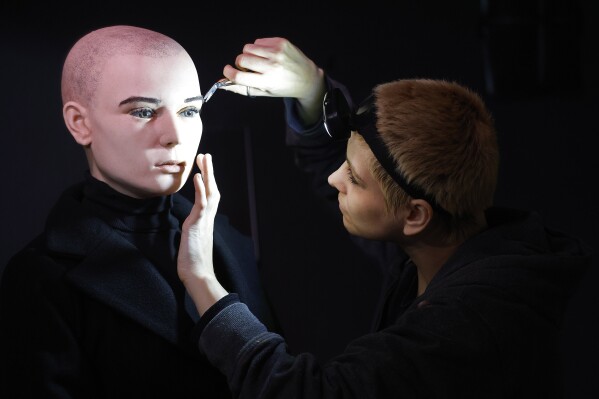In a conversation with Newsweek, Tan France opened up about the difficulties he faced and the "pressure" he felt to return to work so soon after his two children were born.
France is the fashion expert for the hit Netflix show Queer Eye and alongside his busy career, he has joined forces with Bobbie, a mom-founded pediatric nutrition company, to push harder for guaranteed paternity leave in the United States.
He shares two children with his husband Rob France, with the couple welcoming their eldest son, Ismail, via surrogate in July 2021. In 2023, they welcomed their second child, Isaac. In a new campaign called "When Dads Take Leave," France has opened up about returning to work within less than a week after welcoming his first child to the family and just one week after welcoming their second baby.
France explained that while he is aware he is privileged when it comes to working in the entertainment industry, he still had to return to work shortly after welcoming his children to the family, frankly, because he had no other choice.
"Financially, yeah, I could have absolutely decided I wasn't going to work anymore, I was going to quit those jobs, but I was contractually obligated. If I got out of those jobs, I was in trouble. And so, there's so much pressure, even in the entertainment industry, to go back to work as quickly as possible, because you are contractually obligated to get back to work," he told Newsweek.
"But this is just an example of what it actually looks like across the U.S. Although this campaign is about when dads take leave, but also mothers."
France said that having to go to work so soon after welcoming both of his children had a huge impact on him, especially with his first child.
"No one could prepare you for your first child, it's just so overwhelming," he said. "And so that's why I'm so proud to be a part of this campaign with Bobbie, because I understand firsthand what it feels like to not have the time to be able to spend with your newborn, and then I experienced that with my second child.
"And you know, the interesting thing is, I know that so many have said, 'Poor little rich boy, he's an entertainer,' and 'Oh, woe is him,' however, I am an example of what it looks like for most people in the U.S."
Data has shown that 1 in 4 women return to the workforce before they've fully healed from delivering their babies, 30 percent of women will drop out of the workforce within a year after welcoming a child when they don't have access to paid leave and only 11 states offer paid leave, which is one-fifth of the U.S.
"I could barely function going back mentally after a week or so, I can't imagine if I birthed the child going back to work. I just, I mean, I've always known women are a lot stronger than men, unformidable compared to men, but the fact that that is something that they are [dealing with] quietly because we don't have the support that we need is shocking," France explained.
"I know that it's easy for me to say because I'm in a very privileged position but I speak for—and I am speaking—for the people who aren't in my position of privilege. It's a responsibility, I think, for us parents who are in entertainment, or people who have a voice, to get involved."
The TV star said currently, the U.S. doesn't provide enough financial or emotional support for parents.
France believes every parent deserves time at home, whether they are a birthing parent or a non-birthing parent. As America grapples with a paid leave problem, Bobbie and France continue to get loud about the shortcomings in the U.S. federal system that fail to support modern parents.
If passed, the FAMILY Act would give all workers up to 12 weeks of partially paid leave to care for a new child as well as $580 each month for added support.
"People feel like they can't take that time off because it's different for them compared to me, and this is where I understand my privilege. If I were to say, 'Well, I'm just not going to work for three months,' yeah it would affect me financially, but it wouldn't destroy me financially," he explained.
"The average Joe can't just take three months off work because they're not financially supported by the system that we have right now. And so what we're pushing for is a change in the system where there will be a minimum of 12 weeks [of leave] and there will be a minimum of $580 that's provided to a family each month so they can at least cover the necessities.
"And if we can't do that, yeah, there is a major issue in supporting families in the U.S. We expect so much from our parents, we expect so much from our kids, yet we don't support them."
Further data shows that fathers who take two or more weeks of paternity leave are 25 percent more likely to be involved in their child's care nine months later, leading to children with fewer behavioral problems and higher cognitive scores. But data also shows that only 5 percent of fathers take only two weeks if they have leave.
"We do know that 84 percent of Americans do want this for American parents, they want parental leave. They want financial help when they have a child, and there's so much data that supports the fact that when a father takes two weeks paid leave, that makes such a massive impact on his childcare later on in the child development," the fashion expert said.
"And by the time the child hits nine months, the father is then a lot more active if he's been so active with helping raise a child initially, and so there's so much data that supports that this is the way forward. It's really sad to see that in the U.S. And I've been going on about this for years. Well, especially since I had my kids, it really is sad to see that most parents, including women, go back to work within a couple of weeks."
France acknowledged that sometimes people find it difficult to hear these kinds of conversations coming from people in Hollywood but he told Newsweek that while he recognizes he's not in the same position as a lot of Americans, he knows things need to change.
"We're saying we understand that things need to change, and we have more access to people like you, the press, to be able to say we need to start talking about it," he said.
"And so often I hear women talking about it, but as a queer parent in a gay marriage, we don't have a woman in the situation, we are two men. It's our responsibility to also talk about it. And you know how things are, if only women are talking about something, it doesn't change very fast. I know it sucks but as a gay man, I can say how much it sucks. I understand. I would like to believe or empathize with this perspective of both. When men start to get involved and things might actually change."
Disclaimer: The copyright of this article belongs to the original author. Reposting this article is solely for the purpose of information dissemination and does not constitute any investment advice. If there is any infringement, please contact us immediately. We will make corrections or deletions as necessary. Thank you.




